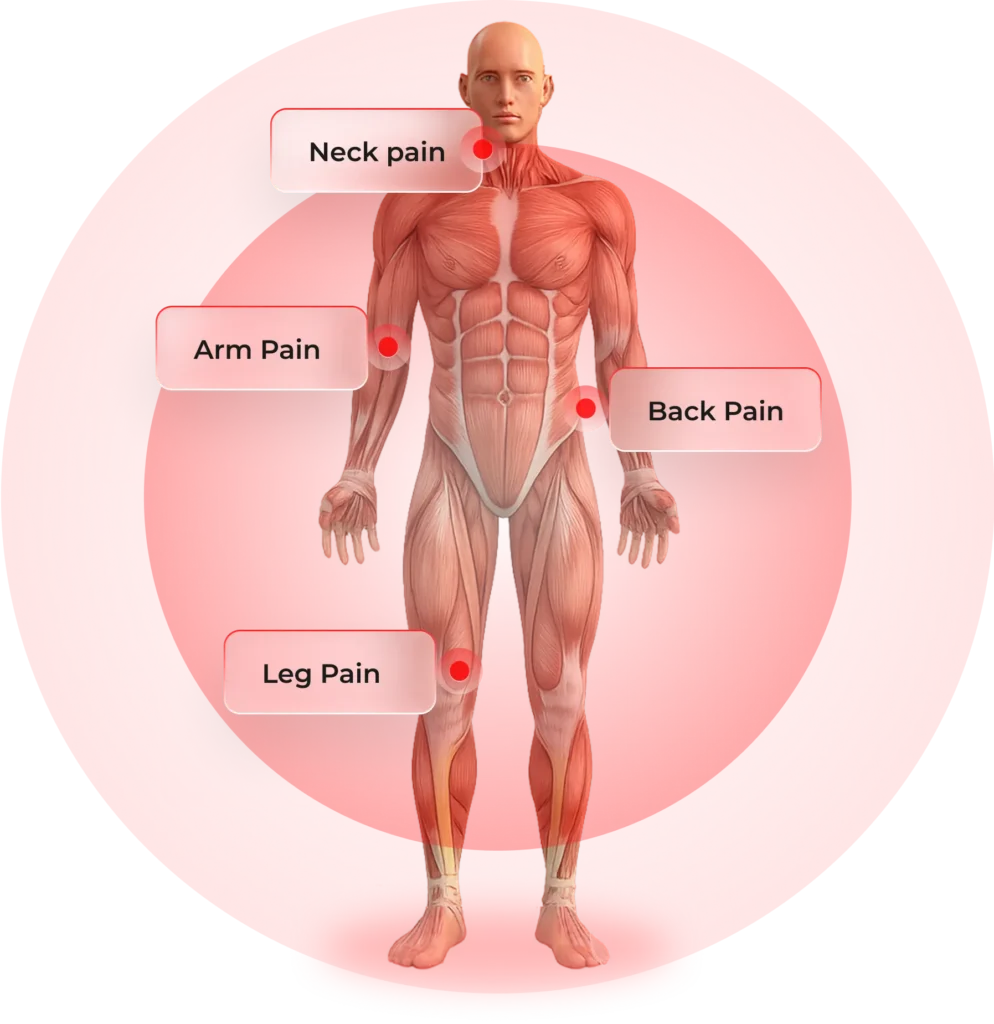Crashes are abrupt. Recovery shouldn’t be guesswork.
We evaluate neck, back, and joint injuries after motor-vehicle collisions and create right-sized plans to restore function.

This includes injuries to muscles, ligaments, and tendons, with whiplash being the most frequent. These injuries can cause pain, swelling, and reduced mobility.
From mild concussions to more severe traumatic brain injuries, it's vital to get evaluated if you've hit your head. Symptoms can be delayed.
Herniated discs, fractured vertebrae, and nerve compression can result from the forces in a car accident, leading to chronic pain and other complications.
Broken bones in the arms, legs, ribs, or hips are common, requiring immediate medical attention and proper care to heal correctly.
A systematic approach to identify, treat, and recover from accident injuries
We conduct a comprehensive examination, including imaging if necessary, to accurately diagnose all your injuries.
Based on your diagnosis, we create a custom treatment plan that may include chiropractic care, physical therapy, and pain management.
We’ll guide you through every step of your recovery, adjusting your treatment as you progress to ensure the best possible outcome.
While we handle post-accident care, some symptoms require immediate emergency medical attention. Call 911 or go to the nearest ER if you experience
Severe pain or pressure in your head, neck, or back
Numbness, weakness, or paralysis
Difficulty breathing or chest pain
Loss of consciousness, confusion, or disorientation
We understand the complexities of dealing with insurance and legal matters after an accident. Our team assists with:
Don’t let pain from a car accident control your life. Schedule your appointment today and let our expert team guide you on the path to healing.



Request Your Same-Day Car Accident Evaluation
Don’t wait in pain — our expert spine specialists are available for same-day evaluations.
Not usually. We begin with a targeted history and exam to determine whether imaging would change your plan. When indicated, we coordinate MRI/CT/X-ray through trusted independent centers. Many post-crash injuries improve with structured, conservative care. If red-flag symptoms appear, we expedite imaging and any necessary referrals so your management remains focused and appropriate.
As soon as practical. Early evaluation clarifies pain generators, sets expectations, and prevents over- or under-activity that can delay recovery. If you experience severe headache after head impact, loss of consciousness, rapidly progressing weakness, new bowel or bladder changes, chest pain, or breathing difficulty—seek emergency care immediately. Otherwise, call us and we’ll schedule you promptly.
Most patients improve with conservative measures—activity modification, home care, medications when appropriate, and guided rehabilitation. Fluoroscopy-guided injections may be considered for targeted relief and diagnostic clarity when pain persists. Surgery is reserved for specific indications such as instability, neurologic deficit, or structural problems unlikely to improve conservatively. Plans are individualized and function-focused.
Yes. We provide stepwise guidance based on your job demands, symptoms, strength, and range of motion. For driving, we consider pain control, neck mobility, and medication effects. When appropriate, we supply capacity notes and collaborate with therapists, case managers, and employers to keep your progression safe, consistent, and aligned with your recovery milestones.
Bring any prior imaging and reports if available, a medication list, allergies, and a brief timeline of your symptoms. Details about your work tasks and daily activities help us tailor restrictions and goals. Wear comfortable clothing for movement testing. If you use a brace or orthotic, bring it. Clear information leads to a right-sized plan.
Yes, it’s common. Inflammation and protective muscle guarding can increase over time, revealing pain generators after the initial shock. Delayed symptoms don’t make injuries less real. Seek evaluation if pain limits sleep, work, or activity; if numbness, tingling, or weakness develops; or if headaches, dizziness, or visual changes follow head impact.
Contact us and set up your doctor visit today to start your journey to pain-free living